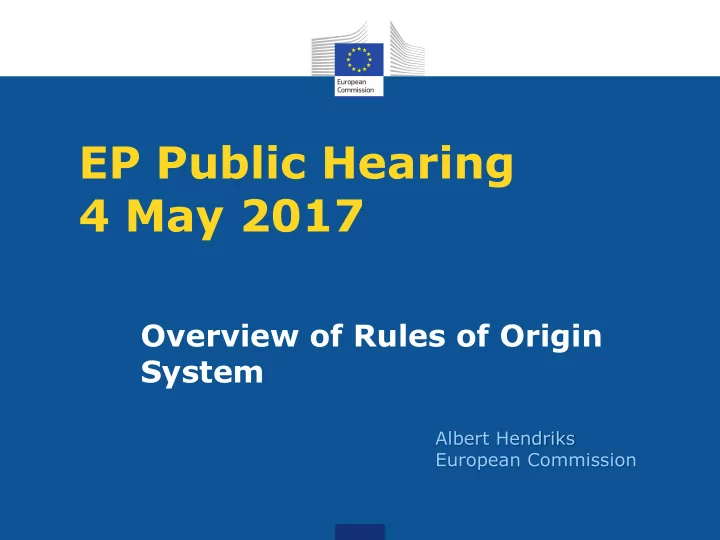

EP Public Hearing 4 May 2017 Overview of Rules of Origin System Albert Hendriks European Commission
Introduction • Rules of Origin determine EU preferential tariff treatment • The origin of a good is often described as its 'nationality' established through strong territorial and physical links with a country. • Preferential origin of goods is actually a matter for negotiation closely linked to market access deals, MFN tariffs discrepancies, sourcing needs and/or aid to development.
Introduction • There is another category of origin rules called "non-preferential". • These are applied for other purposes than preferential tariff treatment. The most important ones are trade defence measures (anti- dumping/anti subsidy, quota, safeguards, etc.), but also origin labelling requirements are based on non-preferential rules.
Basic principles for Preferential origin • Preferential Rules of Origin are divided in three main categories: • - the general provisions for a product to obtain originating status; • - the procedural provisions on proving or claiming preferential tariff treatment, verification and possible denial of preferential tariff treatment by customs in the importing party. • - the Product Specific Rules
General provisions to obtain originating status • either wholly obtained or • fulfil the criteria of so called product specific rules. • Other general provisions also play a role e.g. • - cumulation • - insufficient operations • - other rules for general tolerances, absorption, non- alteration, accounting segregation, principle of territoriality, returned goods, treatment of neutral elements, packing and packaging materials etc.
Procedural requirements related to proving the originating status, claiming preferential tariff treatment Procedural origin requirements have been developed over time and are subject to modernisation
Product Specific Rules PSR identify the criteria for an originating good Such criteria are: - a value rule (e.g. by defining a maximum value for the imported materials used in the production of the product); - a tariff change criterion (which requires that the imported materials are processed in such a way that the final product is classified in a different place in the Harmonised system - or a specific processing requirement
Challenges for the negotiating Preferential Rules of Origin - Explosion of FTA negotiations worldwide - Impact of global value chains on bilateral/regional FTAs - Increasing interactions across FTAs (cumulation) - Confrontation of different traditions in the way to define and manage preferential origin
The 'pillars' for the developement of new rules DETERMINATION OF PREFERENTIAL SIMPLER RULES ORIGIN AND CUMULATION OF ORIGIN EFFICIENT SECURED PREFERENTIAL ORIGIN PROCEDURES ENVIRONMENT RESPONSIBILITIES OF ECONOMIC OPERATORS AND PUBLIC AUTHORITIES IN ENFORCEMENT OF THE ESTABLISHING AND CONTROLLING RULES BY THE COMPETENT PREFERENTIAL ORIGIN AUTHORITIES
Increase the efficiency of procedural requirements: • Re-asses and define the responsibilities of economic operations and public authorities in establishing and controlling preferential origin: • Proof and verification of preferential origin was in general seen as a matter for governmental authorities (in the case of the EU: authorities of the exporting/beneficiary country) based on certificates
Increase the efficiency of procedural requirements: • EU is evolving towards setting up procedural patterns combining 3 principles: • - 1: self-certification by exporters on commercial documents • EU is moving to using self-certification by the exporter as the only system, even when majority of existing agreements provide for a role for governmental authorities • For exporters making out statements on origin the EU is moving towards only requiring a simple registration by the exporter in the so called REX database, moving away from the need to approve (through an authorisation) exporters
Increase the efficiency of procedural requirements: • EU is evolving towards setting up procedural patterns combining 3 principles: • - 2: administrative cooperation in the verification of origin For the verification the EU sticks to the principle for the verifications in the exporting country to be conducted through administrative cooperation. Direct visits by importing authorities to the premises of the exporter for the verification of origin are not allowed under any EU arrangement • - 3: denial of preferential treatment by the importing country where goods appear not being originating • Clarify the exact conditions on when a claim of origin may be denied by the importing authorities
Secured environment ? • Preferential rules of origin mainly implemented by each party on its own , with a 'joint management' limited to: verification of origin, mutual administative assistance, work in commitees set up by FTAs, possible common guidance ('explanatory notes'), and dispute settlement mechanisms • The EU side : 'precautionary measures' ('notices to importers'; possible withdrawal of preference in case of fraud); contribution to capacity building; development of 'monitoring' actions after entry into force
Recommend
More recommend